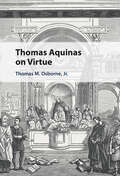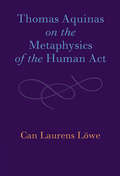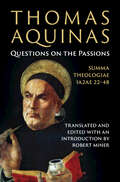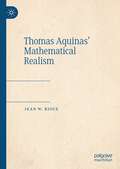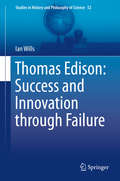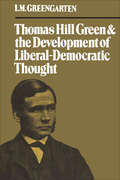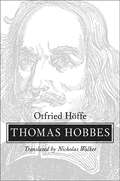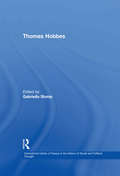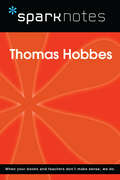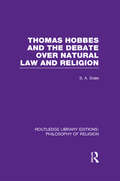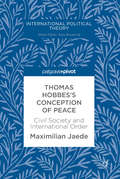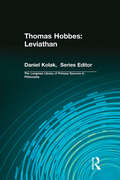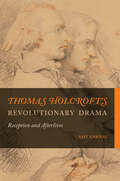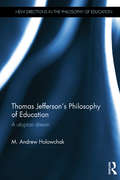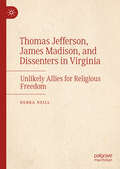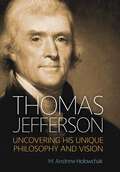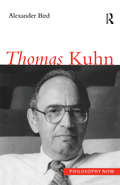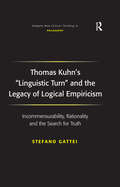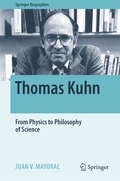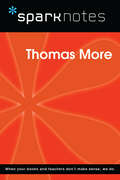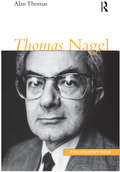- Table View
- List View
Thomas Aquinas on Virtue
by Thomas M. Osborne JrThomas Aquinas produced a voluminous body of work on moral theory, and much of that work is on virtue, particularly the status and value of the virtues as principles of virtuous acts, and the way in which a moral life can be organized around them schematically. Thomas Osborne presents Aquinas's account of virtue in its historical, philosophical and theological contexts, to show the reader what Aquinas himself wished to teach about virtue. His discussion makes the complexities of Aquinas's moral thought accessible to readers despite the differences between Thomas's texts themselves, and the distance between our background assumptions and his. The book will be valuable for scholars and students in ethics, medieval philosophy, and theology.
Thomas Aquinas on War and Peace
by Gregory M. ReichbergInquiring 'whether any war can be just', Thomas Aquinas famously responded that this may hold true, provided the war is conducted by a legitimate authority, for a just cause, and with an upright intention. Virtually all accounts of just war, from the Middle Ages to the current day, make reference to this threefold formula. But due in large measure to its very succinctness, Aquinas's theory has prompted contrasting interpretations. This book sets the record straight by surveying the wide range of texts in his literary corpus that have bearing on peace and the ethics of war. Thereby emerges a coherent and nuanced picture of just war as set within his systematic moral theory. It is shown how Aquinas deftly combined elements from earlier authors, and how his teaching has fruitfully propelled inquiry on this important topic by his fellow scholastics, later legal theorists such as Grotius, and contemporary philosophers of just war.
Thomas Aquinas on the Metaphysics of the Human Act
by Can Laurens LöweThis book offers a novel account of Aquinas's theory of the human act. It argues that Aquinas takes a human act to be a composite of two power-exercises, where one relates to the other as form to matter. The formal component is an act of the will, and the material component is a power-exercise caused by the will, which Aquinas refers to as the 'commanded act.' The book also argues that Aquinas conceptualizes the act of free choice as a hylomorphic composite: it is, materially, an act of the will, but it inherits a form from reason. As the book aims to show, the core idea of Aquinas's hylomorphic action theory is that the exercise of one power can structure the exercise of another power, and this provides a helpful way to think of the presence of cognition in conation and of intention in bodily movement.
Thomas Aquinas: Summa Theologiae 1a2ae 22-48
by Robert MinerThomas Aquinas's Questions on the passions form part of the Summa Theologiae, Aquinas's best-known work. This first standalone edition shows, through a translation that is both rigorously accurate and mirrors the rapid tempo of Aquinas's Latin, what Aquinas says in his landmark treatment of the passions. Aquinas sets the parameters and terms of debate for numerous later theorists of the passions, including Descartes, Hobbes, Spinoza and Hume. Some have alleged that Paul and later Christians have (in Nietzsche's words) “an evil eye for the passions,” judging them as 'dirty, disfiguring and heartbreaking'. Yet readers of the present translation will perceive that Aquinas regards the passions as part of created nature, and thereby good in their essence. As they encounter Aquinas's treatment, they will also deepen their knowledge of particular passions-including love, hatred, desire, aversion, pleasure, sorrow, hope, despair, fear, and anger.
Thomas Aquinas’ Mathematical Realism
by Jean W. RiouxIn this book, philosopher Jean W. Rioux extends accounts of the Aristotelian philosophy of mathematics to what Thomas Aquinas was able to import from Aristotle’s notions of pure and applied mathematics, accompanied by his own original contributions to them. Rioux sets these accounts side-by-side modern and contemporary ones, comparing their strengths and weaknesses.
Thomas Edison: Success and Innovation through Failure (Studies in History and Philosophy of Science #52)
by Ian WillsThis book develops a systematic approach to the role of failure in innovation, using the laboratory notebooks of America's most successful inventor, Thomas Edison. It argues that Edison's active pursuit of failure and innovative uses of failure as a tool were crucial to his success. From this the author argues that not only should we expect innovations to fail but that there are good reasons to want them to fail. Using Edison's laboratory notebooks, written as he worked and before he knew the outcome we see the many false starts, wrong directions and failures that he worked through on his way to producing revolutionary inventions. While Edison's strengths in exploiting failure made him the icon of American inventors, they could also be liabilities when he moved from one field to another. Not only is this book of value to readers with an interest in the history of technology and American invention, its insights are important to those who seek to innovate and to those who employ and finance them.
Thomas Hardy and Desire
by Jane ThomasDrawing on a broad concept of desire, informed by poststructuralist theorists this book examines the range of Hardy's work. It demonstrates the sustained nature of his thinking about desire, its relationship to the social and symbolic network in which human subjectivity is constituted and art's potential to offer fulfilment to the desiring subject.
Thomas Hill Green and the Development of Liberal-Democratic Thought
by I. M. GreengartenThomas Hill Green (1836-1882) was a leading British philosopher and political figure and founder of the school of British Idealism, which displaced the philosophy of Bentham and John Stuart Mill as the dominant tradition in British universities from 1880 into the twentieth century. Greengarten presents a detailed analysis of Green's thought, including his theories of political obligation, property, self-realization, and human nature, and developed the necessary tools for an analysis of Green's work and the tradition of liberal-democratic thought. He finds in Green a view of human nature and human potentialities which is in striking contract to the views of earlier liberal thinkers, and remarkably similar to that of Marx - despite Green's clear and often passionate defence of capitalism and market freedom. His concept of human nature is of a divided, self-contradictory nature; his theory of the true good is of a good that is to be shared, a common good that is not attainable through the selfish pursuit of private goods; his vision of the good society foresees the elimination of poverty, and the establishment of a classless society wherein all members would have equal opportunity to develop and realize their potential. This book offers a fresh perspective on Green and raises issues of importance in the field of social and political theory.
Thomas Hobbes
by Otfried HöffeBest known for his contributions to political philosophy, Thomas Hobbes set out to develop a coherent philosophical system extending from logic and natural philosophy to civil and religious philosophy. In this introduction to Hobbes's thought, Otfried Höffe begins by providing an overview of the entire scope of his work, making clear its systematic character through analysis of his natural philosophy, his individual and social anthropology, and his political thought. He then offers an innovative examination of religious and ecclesiastical questions, touching not only on the political implications of religion so important to Hobbes, but also on his attempt to reconstruct Christianity in terms of a materialistic philosophy. He also explores Hobbes's continuous critique of Aristotle and Aristotelian Scholastics, in which Höffe argues that Hobbes and Aristotle have much more in common philosophically than is normally supposed—and certainly more than Hobbes himself acknowledged. Finally, Höffe sketches the influence Hobbes had and continues to have on the development of legal and political philosophy.
Thomas Hobbes (International Library of Essays in the History of Social and Political Thought)
by Gabriella SlompThe aim of this collection is twofold: on the one hand, it brings together the most significant and influential articles on Hobbes that have been published in the twentieth century; on the other hand, it aims at capturing the trend of fragmentation of Hobbes studies offering a taste of early epic interpretations that engaged with the whole of Hobbes’s theory, and a taste of later works interested in capturing more limited narratives and at recounting parallel stories that seem to be running through Hobbes’s works. The introduction offers a compass to orient the reader’s journey through the collection.
Thomas Hobbes (SparkNotes Philosophy Guide)
by SparkNotesThomas Hobbes (SparkNotes Philosophy Guide) Making the reading experience fun! SparkNotes Philosophy Guides are one-stop guides to the great works of philosophy–masterpieces that stand at the foundations of Western thought. Inside each Philosophy Guide you&’ll find insightful overviews of great philosophical works of the Western world.
Thomas Hobbes and the Debate over Natural Law and Religion (Routledge Library Editions: Philosophy of Religion)
by Stephen A. StateThe argument laid out in this book discusses and interprets the work of Hobbes in relation to religion. It compares a traditional interpretation of Hobbes where Hobbes’ use of conventional terminology when talking about natural law is seen as ironic or merely convenient despite an atheist viewpoint, with the view that Hobbes’ morality is truly traditional and Christian. The book considers other thinkers of the age in tandem with Hobbes and discusses in detail his theology inspired by corporeal mechanics. The position is that there are significant senses in which Hobbes can be said to be a traditional natural law theorist.
Thomas Hobbes's Conception of Peace: Civil Society And International Order (International Political Theory Ser.)
by Maximilian JaedeThis book explores Hobbes’s ideas about the internal pacification of states, the prospect of a peaceful international order, and the connections between civil and international peace. It questions the notion of a negative Hobbesian peace, which is based on the mere suppression of violence, and emphasises his positive vision of everlasting peace in a well-governed commonwealth. The book also highlights Hobbes’s ideas about international coexistence and cooperation, which he considers integral to good government. In examining Hobbes’s conception of peace, it provides a fresh perspective on his international political thought. The findings also have wider implications for the ways in which we think about Hobbes’s relationship to the realist and liberal traditions of international thought, and will appeal to students and scholars of political theory and international relations.
Thomas Hobbes: Leviathan (Longman Library of Primary Sources in Philosophy)
by Thomas Hobbes Marshall MissnerPart of the “Longman Library of Primary Sources in Philosophy,” this edition of Hobbes's Leviathan is framed by a pedagogical structure designed to make this important work of philosophy more accessible and meaningful for undergraduates.
Thomas Hobbes: On the Citizen
by Richard Tuck Thomas HobbesDe Cive (On the Citizen) is the first full exposition of the political thought of Thomas Hobbes, the greatest English political philosopher of all time. Professors Tuck and Silverthorne have undertaken the first complete translation since 1651, a rendition long thought (in error) to be at least sanctioned by Hobbes himself. On the Citizen is written in a clear, straightforward, expository style, offering students a more digestible account of Hobbes' political thought than even Leviathan itself. This new translation is itself a very significant scholarly event.
Thomas Holcroft’s Revolutionary Drama: Reception and Afterlives (Transits: Literature, Thought & Culture, 1650-1850)
by Amy GarnaiA key figure in British literary circles following the French Revolution, novelist and playwright Thomas Holcroft promoted ideas of reform and equality informed by the philosophy of his close friend William Godwin. Arrested for treason in 1794 and released without trial, Holcroft was notorious in his own time, but today appears mainly as a supporting character in studies of 1790s literary activism. Thomas Holcroft’s Revolutionary Drama authoritatively reintroduces and reestablishes this central figure of the revolutionary decade by examining his life, plays, memoirs, and personal correspondence. In engaging with theatrical censorship, apostacy, and the response of audiences and critics to radical drama, this thoughtful study also demonstrates how theater functions in times of political repression. Despite his struggles, Holcroft also had major successes: this book examines his surprisingly robust afterlife, as his plays, especially The Road to Ruin, were repeatedly revived worldwide in the nineteenth century.
Thomas Jefferson's Philosophy of Education: A utopian dream (New Directions in the Philosophy of Education)
by M. Andrew HolowchakThomas Jefferson had a profoundly advanced educational vision that went hand in hand with his political philosophy - each of which served the goal of human flourishing. His republicanism marked a break with the conservatism of traditional non-representative governments, characterized by birth and wealth and in neglect of the wants and needs of the people. Instead, Jefferson proposed social reforms which would allow people to express themselves freely, dictate their own course in life, and oversee their elected representatives. His educational vision aimed to instantiate a progressive social climate only dreamed of by utopists such as Thomas More, James Harrington and Louis-Sébastian Mercier. This book offers a critical articulation of the philosophy behind Jefferson’s thoughts on education. Divided into three parts, chapters include an analysis of his views on elementary and higher education, an investigation of education for both the moral-sense and rational faculty, and an examination of education as lifelong learning. Jefferson’s educational rationale was economic, political and philosophical, and his systemic approach to education conveys a systemic, economic approach to living, with strong affinities to Stoicism. Thomas Jefferson’s Philosophy of Education will be key reading for philosophers, historians and postgraduate students of education, the history of education and philosophy.
Thomas Jefferson, James Madison, and Dissenters in Virginia: Unlikely Allies for Religious Freedom
by Debra NeillThis book follows the campaign to disestablish religion in Virginia from 1776 to 1786, when Thomas Jefferson&’s bill to establish religious freedom was passed. This volume seeks to tell the story of Jefferson and James Madison&’s collaboration with Virginia&’s religious dissenters; in doing so, Neill works to understand why religion was disestablished in Virginia. Neill argues that despite their religious differences these unlikely allies shared a basic understanding of what religious freedom meant and how best to secure it: by severing the ties between church and state.
Thomas Jefferson: Uncovering His Unique Philosophy and Vision
by M. Andrew HolowchakThis is the first book to systematize the philosophical content of Thomas Jefferson's writings. Sifting through Jefferson's many addresses, messages, and letters, philosopher M. Andrew Holowchak uncovers an intensely curious Enlightenment thinker with a well-constructed, people-sympathetic, and consistent philosophy. As the author shows, Jefferson's philosophical views encompassed human nature, the cosmos, politics, morality, and education. Beginning with his understanding of the cosmos, part one considers Jefferson's philosophical naturalism and the influence on him of Francis Bacon, Isaac Newton, and John Locke. The next section critically examines his political viewpoints, specifically his republicanism, liberalism, and progressivism. The third part, "Jefferson on Morality," analyzes Jefferson's thoughts on human nature, his moral-sense theory, and his notion of "natural aristoi" (best or most virtuous citizens). Finally, "Jefferson on Education" reviews his ideas on properly educating the people of the new nation for responsible, participatory citizenry. Jefferson conceived of the United States as a "great experiment"-embodying a vision of a government responsibly representative of its people and functioning for the sake of them. This book will help readers understand the philosophical perspective that sustained this audacious, innovative, and people-first experiment.
Thomas Kuhn (Philosophy Now Ser.)
by Alexander BirdThomas Kuhn (1922-96) transformed the philosophy of science. His seminal 1962 work "The Structure of Scientific Revolutions" introduced the term 'paradigm shift' into the vernacular and remains a fundamental text in the study of the history and philosophy of science. This introduction to Kuhn's ideas covers the breadth of his philosophical work, situating "The Structure of Scientific Revolutions" within Kuhn's wider thought and drawing attention to the development of his ideas over time. Kuhn's work is assessed within the context of other philosophies of science notably logical empiricism and recent developments in naturalized epistemology. The author argues that Kuhn's thinking betrays a residual commitment to many theses characteristic of the empiricists he set out to challenge. Kuhn's influence on the history and philosophy of science is assessed and where the field may be heading in the wake of Kuhn's ideas is explored.
Thomas Kuhn's 'Linguistic Turn' and the Legacy of Logical Empiricism: Incommensurability, Rationality and the Search for Truth (Ashgate New Critical Thinking in Philosophy)
by Stefano GatteiPresenting a critical history of the philosophy of science in the twentieth century, focusing on the transition from logical positivism in its first half to the "new philosophy of science" in its second, Stefano Gattei examines the influence of several key figures, but the main focus of the book are Thomas Kuhn and Karl Popper. Kuhn as the central figure of the new philosophy of science, and Popper as a key philosopher of the time who stands outside both traditions. Gattei makes two important claims about the development of the philosophy of science in the twentieth century; that Kuhn is much closer to positivism than many have supposed, failing to solve the crisis of neopostivism, and that Popper, in responding to the deeper crisis of foundationalism that spans the whole of the Western philosophical tradition, ultimately shows what is untenable in Kuhn's view. Gattei has written a very detailed and fine grained, yet accessible discussion making exceptionally interesting use of archive materials.
Thomas Kuhn: From Physics to Philosophy of Science (Springer Biographies)
by Juan V. MayoralThis new biography of Thomas S. Kuhn pays attention to the continuous development of his ideas. Mayoral provides a comprehensive overview of Kuhn's life and work. The book explores how Kuhn&’s theory develops from its beginnings at Harvard University in the early 1950s through the early 1990s at the MIT and also describes Kuhn's parallel lifetime. Between those decades (1950s and 1990s), Kuhn went through different academic institutions, obtained a high status as a public intellectual, and shifted from the history of science to the philosophy of science (and back) as his main research target. All of this left a trace in his philosophical view of science, enriching and changing it since his early training as a theoretical physicist. In this book, Kuhn is considered as an intellectual in evolution, and his contributions are assessed against the backdrop of the different contexts that he traversed. Therefore, there shall not be a static figure of this intellectual, as there shall not be a static figure of the surrounding intellectual contexts, either. At the same time, however, this book is planned so that each chapter provides the reader with a picture of a significant period in Kuhn&’s development and the main ideas that can be observed in it. The book is useful for upper undergraduates in philosophy, especially in philosophy of science, in general history and history of science, in the social sciences and other fields of humanities, and for scientifically trained individuals interested in this author. Kuhn scholars shall find this book useful for their studies on Kuhn insofar as new unpublished documents are employed, new facts about Kuhn&’s life are provided, and a full interpretation of Kuhn&’s evolving system of philosophy of science is built and discussed.
Thomas More (SparkNotes Philosophy Guide)
by SparkNotesThomas More (SparkNotes Philosophy Guide) Making the reading experience fun! SparkNotes Philosophy Guides are one-stop guides to the great works of philosophy–masterpieces that stand at the foundations of Western thought. Inside each Philosophy Guide you&’ll find insightful overviews of great philosophical works of the Western world.
Thomas More: A Life
by Joanne PaulThe definitive biography of the man who dominated political and intellectual circles in England during the sixteenth century: Thomas More.Born into the era of the Wars of the Roses, educated during the European Renaissance, rising to become Chancellor of England, and ultimately destroyed by Henry VIII, Thomas More was one of the most famous—and notorious—figures in English history. Was he a saintly scholar, the visionary author of Utopia, and an inspiration for statesmen and intellectuals even today? Or was he the cruel zealot famously portrayed in Hilary Mantel's Wolf Hall? Thomas More: A Life is a monumental biography of this hypnotic, flawed figure. Overturning prior interpretations of this titan of the sixteenth century, Joanne Paul shows Thomas More to have been intellectually and politically central to the making of modern Europe. Based on new archival discoveries and drawing on more than a decade of research into More&’s life and work, this is a richly told story of faith and politics that illuminates a man who, more than four hundred years after his execution, remains one of the most brilliant minds of the Renaissance.
Thomas Nagel (Philosophy Now Ser.)
by Alan ThomasIn the first systematic study of the philosophy of Thomas Nagel, Alan Thomas discusses Nagel's contrast between the "subjective" and the "objective" points of view throughout the various areas of his wide ranging philosophy. Nagel's original and distinctive contrast between the subjective view and our aspiration to a "view from nowhere" within metaphysics structures the chapters of the book. A "new Humean" in epistemology, Nagel takes philosophical scepticism to be both irrefutable and yet to indicate a profound truth about our capacity for self-transcendence. The contrast between subjective and objective views is then considered in the case of the mind, where consciousness proves to be the central aspect of mind that contemporary theorising fails to acknowledge adequately. The second half of the book analyses Nagel's work on moral and political philosophy where he has been most deeply influential. Topics covered include the contrast between agent-relative and agent-neutral reasons and values, Nagel's distinctive version of a hybrid ethical theory, his discussion of life's meaningfulness and finally his sceptical arguments about whether a liberal society can reconcile the conflicting moral demands of self and other.
